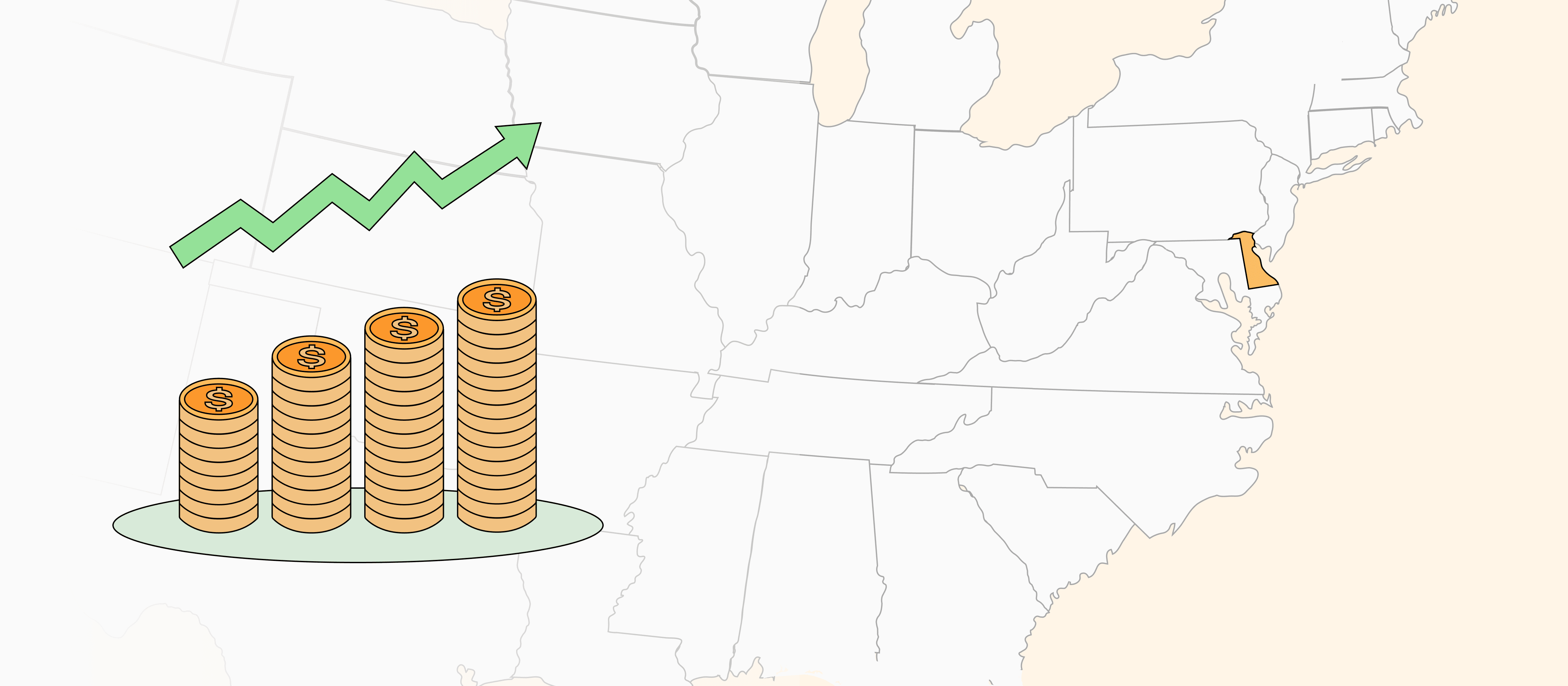| Rent Increase Facts | Answer |
| Reason Needed? | No |
| Maximum Amount | None |
| Required Notice | 60 or 90 Days |
Does Delaware Have Rent Control Laws?
Delaware does not have rent control laws limiting the amount landlords may ask for. Delaware state law does not prohibit local governments from establishing rent control laws.
When Can a Landlord Raise Rent in Delaware?
Landlords in Delaware can raise the rent at any time, as long as they comply with the following:
- Give reasonable notice
- Don’t break any local rent control laws
- Wait until the end of the lease term (unless otherwise specified in the lease)
- Aren’t raising rent for discriminatory or retaliatory reasons
90 days before the end of a year-long lease, a landlord sends the tenant a notice that rent will increase by 6% if they choose to renew the lease.
When Can’t a Landlord Raise Rent in Delaware?
Landlords in Delaware may not raise the rent if:
- The increase is applied in a way that discriminates against one of the protected classes specified in the Fair Housing Act
- It is done as retaliation against a protected tenant action, such as filing a complaint
- It is during the middle of a lease’s fixed term (unless stated otherwise in the lease agreement)
In addition to the above protections, Delaware law prevents discrimination in housing due to source of income or occupation.
How Often Can Rent Be Increased in Delaware?
Landlords in Delaware can increase the rent as often as they choose as long as they provide sufficient notice each time unless the rental unit is a mobile home.
Rent increases on mobile homes are limited to once per year.
How Much Notice is Needed to Raise Rent in Delaware?
Delaware landlords must give at least 60 days written notice to increase the rent before the expiration of the lease term. The tenant must respond to the notice at least 45 days before the expiration of the lease term to object to the rent increase.
If the rental unit is a mobile home, the landlord must give 90 days notice (but no more than 120 days) before the effective date of the increase.
How Much Can a Landlord Raise Rent in Delaware?
In Delaware, landlords can raise the rent by any amount and for any reason (except for mobile homes) as long as they give proper notice, don’t do so during the fixed term of a lease, and aren’t doing so for certain discriminatory or retaliatory reasons.
Mobile Homes. Rent increases that exceed the average rate of inflation require justification. Landlords must contact the Delaware Manufactured Home Relocation Authority (DEMHRA) for the current rate.
Sources
- 1 Del. Code tit. 25 § 5516(c)
-
If the tenant proves that the landlord has instituted any of the actions set forth in subsection (b) of this section within 90 days of any complaints or act as enumerated above, such conduct shall be presumed to be a retaliatory act.
Source Link
- 2 Del. Code tit. 25 § 5116(b)
-
No person shall demand or receive a greater sum as rent for the use and occupancy of any premises because the person renting or desiring to rent the premises is of a particular race, creed, religion, marital status, color, sex, sexual orientation, gender identity, national origin, disability, age, source of income, occupation, housing status or has a child or children in the family.
Source Link
- 3 Del. Code tit. 25 § 7051
-
(a) A community owner may not increase a tenant’s lot rent more than once during any 12-month period, regardless of the term of the tenancy or the term of the rental agreement.
(b) A community owner may only increase rent if the rent increase complies with all of the following:
(1) Any lease provision providing for a specific amount of rent for a specific period of time.
(2) The applicable requirements of this chapter.
(c)(1) A community owner must provide written notice of a rent increase at least 90 days, but no more than 120 days, before the first day the increased amount of rent is due, to all of the following:
a. Each affected homeowner.
b. The homeowners’ association, if 1 exists.
c. DEMHRA.
(2) The notice under paragraph (c)(1) of this section must identify all affected homeowners by lot number, name, group, or phase. If the affected homeowners are not identified by name, the community owner shall make the names and addresses available, upon request, to any affected homeowner, homeowners’ association, or DEMHRA.
Source Link - 4 Del. Code tit. 25 § 5107(a) & (b)
-
(a) If the landlord intends to renew the rental agreement subject to amended or modified provisions, the landlord shall give the tenant a minimum of 60 days’ written notice prior to the expiration of the rental agreement that the agreement shall be renewed subject to amended or modified provisions, including, but not limited to, amended provisions relating to the length of term or the amount of security deposit or rent. Such notice shall specify the modified or amended provisions, the amount of any rent or security deposit and the date on which any modifications or amendments shall take effect.
(b) After receipt of such notice from the landlord, unless the tenant notifies the landlord of the tenant’s intention to terminate the existing rental agreement a minimum of 45 days prior to the last day of the term, the provisions of the amended or modified rental agreement shall be deemed to have been accepted and agreed to by the tenant, and the terms of the lease, as amended, shall take full force and effect.
Source Link

